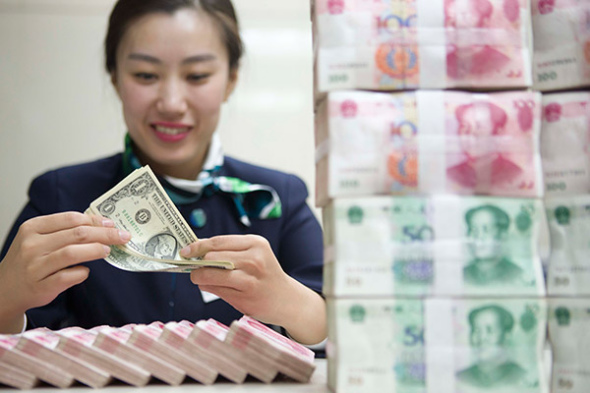 A clerk counts cash at a bank in Taiyuan, capital of Shanxi province. (Photo/China News Service) Central bank to press ahead with efforts to internationalize currency Yuan exchange rates will have a more stable foundation after the 19th National Congress of the Communist Party of China and the market will have a bigger role in determining the currency's value, a top central bank official said on Wednesday. The People's Bank of China, the central bank, has almost withdrawn its "regular" intervention in the foreign exchange market, Pan Gongsheng, head of the State Administration of Foreign Exchange, said while attending the congress. "We can also see that the exchange rate is more market-driven and has been more stable recently," said Pan, who is also a deputy governor of the central bank. The central bank released a report on its website on Tuesday saying that the bank will continually facilitate the yuan's internationalization to reflect a more stable position in the global monetary system. The PBOC also expects yuan usage to rise so that it can play a more important role as a global reserve currency. Prior to the market opening on Wednesday, the yuan's midpoint rate for daily trading, or the reference rate, was 6.5991 per dollar, which is slightly weaker than the previous fixing of 6.5883. The stable yuan, together with positive readings from the official purchasing managers' index this month, and rising market sentiment following the central bank's reserve requirement cut on Sept 30, adds to the sense of stability ahead of the Party congress, Fielding Chen and Tom Orlik, economists with Bloomberg, wrote in a research note. A yuan rally to its highest level since early 2016 at the start of the month may have prompted more foreign exchange conversion by dollar-rich corporates, they said. Wang Youxin, an analyst with Bank of China, said market expectations for depreciation of the yuan's exchange rate have made a switch this year, as data show companies and private sector have greater appetite for settlement. "China's yuan has fully recovered from 2016 and has recouped from last year's loss," he said. Demand for the yuan has risen in August, he said. "Supported by the country's improving economic data, the currency is expected to remain stable till the end of the year," he said. "Improved market expectations provide a favorable environment for pressing ahead with reform," he added. "The general trend is to move toward a more market-based regime." It has been exactly a year since the International Monetary Fund included the yuan in its basket of five reserve currencies, in addition to the US dollar, the euro, the Japanese yen and the British pound. Analysts also expected an acceleration of the financial sector opening-up after the congress, by further freeing cross-border capital flows to help strengthen the yuan's global position. |
Powered by Discuz! X3.4
© 2001-2013 Comsenz Inc.